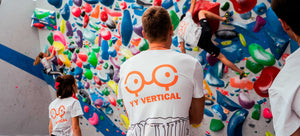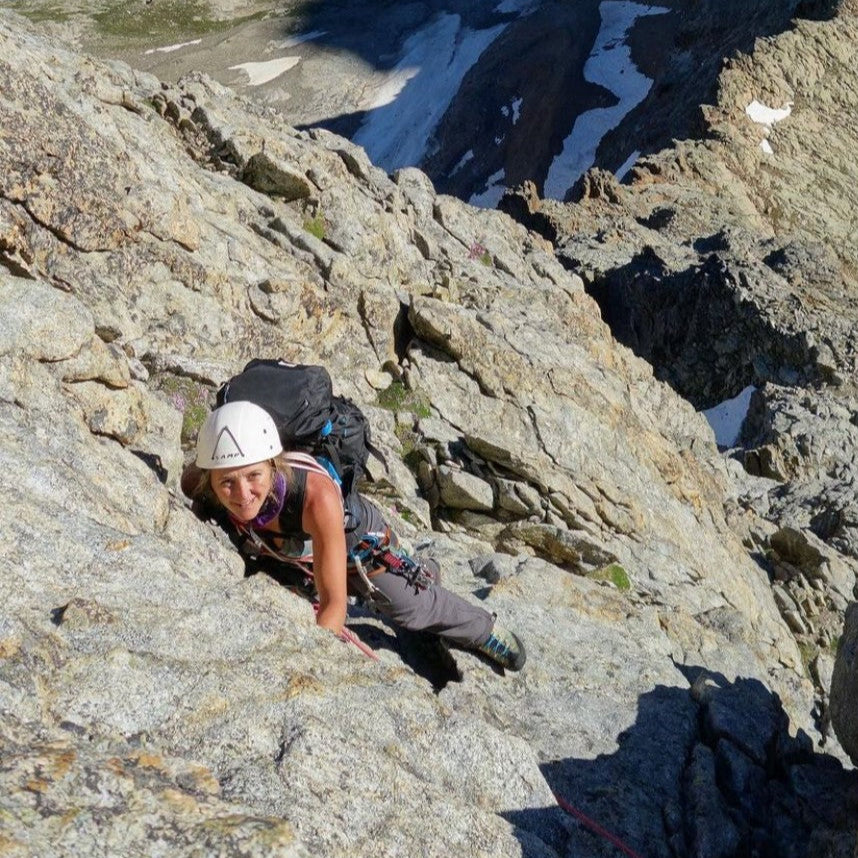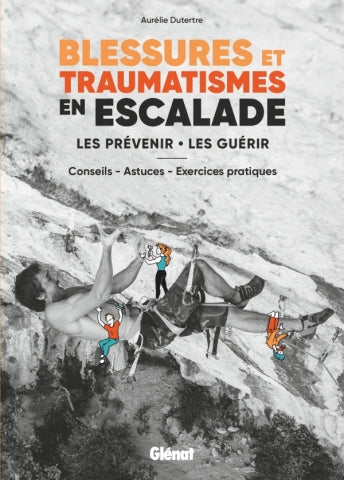
Aurélie Dutertre
Aurélie Dutertre - Presentation
Aurélie Dutertre is a physiotherapist and osteopath who has accompanied the French climbing team for almost 10 years.
She recently wrote a book entitled Injuries and Trauma in Climbing: Preventing and Healing Them to help climbers of all levels prevent and treat typical climbing injuries.
As she puts it so well: "Injury prevention is a major tool that is too often neglected.

His project
Today, Aurélie's aim is to teach climbers of all levels about the consequences of injury and what to do to avoid it.
She is also preparing a number of events with climbing professionals to support her in this project.
Aurélie has just published a book:
Injuries and traumas in climbing: prevent them, heal them in which she shares her advice, tips and protocols to help climbers prevent injuries, relieve pain, mobilize and strengthen injured areas, and establish a routine of self-massage, stretching and a healthy lifestyle.

Climbing as seen by Aurélie :
Can you introduce yourself?
"My name is Aurélie Dutertre, I'm 47 and the mother of two children. I've been practicing for around twenty years. I started out as a physiotherapist in a sports rehabilitation center in Cap-Breton, and since 2010 I've been working as an osteopath in my own practice in Isère."
Why did you choose the osteopath/physiotherapist route?
"I chose this training to be in contact with people. This profession enables me to perform manual techniques based on pain-free bone and muscle manipulation. My profession is aimed at everyone, from infants to athletic adults."
Why this focus on climbing?
"I went into top-level sport immediately after finishing my physiotherapy studies.
I was lucky enough to join the Franck Cammas trimaran team and get a taste of offshore racing, like the Route du Rhum or the Figaro solo race.
After my time in the sailing world, I moved to Isère. Naturally, my eye fell on outdoor sports, and more specifically on skiing and climbing.
I joined the FFME (Fédération Française de Montagne et d'Escalade) in 2011, working for two years with the French ski mountaineering team.
In 2013, I started working with the French climbing teams for five years with the Senior diff team.
In 2017 I joined the French youth team on diff, bouldering and speed.
Climbing is a demanding sport which, in addition to its many physical benefits, also has a psychological dimension. It calls for reflection, creativity and sharpened concentration. Climbing is a technical and psychological activity that requires method.
What's your best memory (during your time with the French national team)?
"I have a lot of memories! I remember the victories with those shouts of joy.
The moment when you watch the athlete climb his route with bated breath ... The fear that he'll miss the hold and fall ... Moments when the pressure is off, or you read in the eyes of the winner that immeasurable joy. The pride of having given everything and of having succeeded in topping the route.
Memories of travel, discovering countries and regions while on the move in France or abroad.
For 10 years, I've been lucky enough to work with Corentin Le Goff at senior level and Corinne Theroux at youth level. Coaches who are kind to their athletes and give all their energy so that the climber can express himself to the full in his climbing!"
Why did you write this book?
"I came up with the idea for this book to help patients practice at home the simple exercises I offer in the office.
The list of exercises is not exhaustive, but complements the rehabilitation suggested by your physiotherapist or doctor. The treatment protocols will help you to relieve pain, mobilize and strengthen the injured area. Exercises can be performed at home or in the dedicated areas of climbing gyms. This book can help you manage your pain and prevent climbing injuries.
In my opinion, injury prevention is a major tool that is too often neglected.
What does the phrase "live your sport better" mean to you?
"Injury is not inevitable, climbing is an excellent sport for staying healthy."
What are your plans/ideas for the coming years?
"In the immediate future, I'd like to work with climbers of all levels to get the message across about the consequences of injury and what to do to avoid it.
I prepare numerous events with climbing professionals (athletes, physical trainers and coaches). In particular, I invite top-level climbers to talk about their experience of injury.
- What's the link between the mind and the injury?
- The role of rehabilitation and gradual recovery!
Injury affects not only training, but also the athlete's physique. Inevitably, it also has an impact on the mind. If the injury is badly managed, it can become a burden and take up too much space in the mind. During the rehabilitation period, you need to analyze the causes. Injury is not a fatality, it's a warning signal, often evoking something we're not doing properly, such as overtraining, lack of rest, mental overload or ill-adapted training conditions. It's time to take stock of what's going wrong! The most successful athletes in recovery and reathletization are those who take this mental approach.



